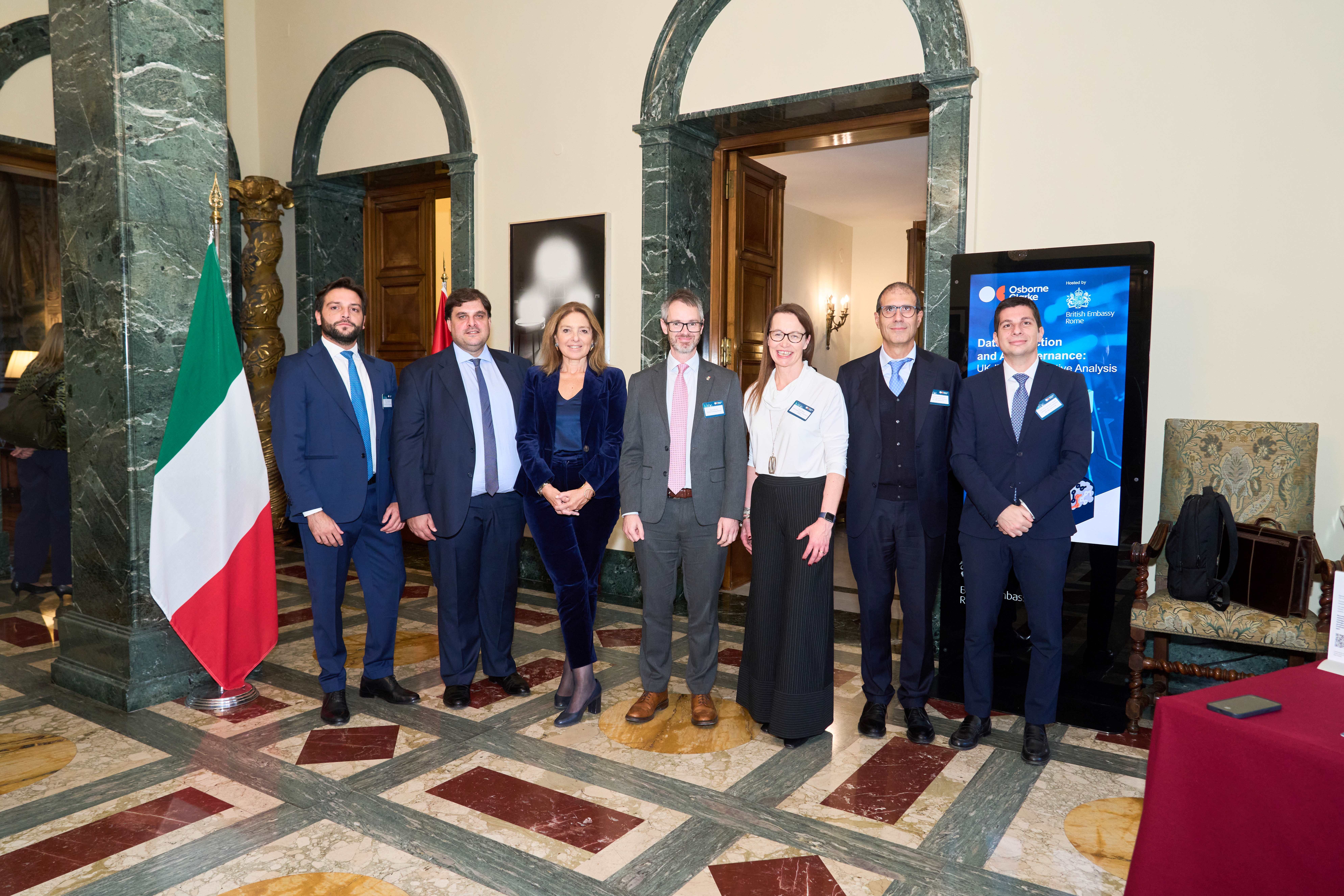Osborne Clarke and the British Government's Department for Business and Trade: Data Protection and AI Governance the focal point of the event involving leading authorities
Published on 29th October 2025

Yesterday, at Villa Wolkonsky, the official residence of the British Ambassador to Italy, a round table discussion was held, organised by the international law firm Osborne Clarke and the British Government's Department for Business and Trade. During the discussion, authoritative representatives from the Italian Data Protection Authority (GPDP), the UK's Information Commissioner's Office (ICO), the Italian National Cybersecurity Agency (ACN), and the UK's Department for Science, Innovation and Technology (DSIT) debated the different regulatory approaches adopted by the United Kingdom and Italy on the subject of artificial intelligence and data protection.
As the leading destination for AI Growth and Investments in Europe, the United Kingdom favours safety, fairness, transparency, accountability, and contestability - offering a dynamic model that encourages innovation while safeguarding public trust.
In Italy, the recent approval of the enabling law on artificial intelligence has indicated the path chosen. The approach adopted, consistent with the principles already established within the Italian legal system and jurisprudence, promotes transparency, accountability and the protection of fundamental rights. In order to ensure the application and implementation of national and European Union legislation on artificial intelligence, the Agency for Digital Italy (AgID) and the National Cybersecurity Agency have been designated as the national authorities for artificial intelligence, without prejudice to the roles of other authorities. Among these, the Data Protection Authority will continue to supervise the processing of personal data, including that carried out using AI systems. In addition, forms of cooperation between the ACN and public and private entities from NATO countries and non-EU countries may be authorised, encouraging possible new collaborations between Italy and the United Kingdom.
Following the welcome from the Deputy Head of Mission, Italy and San Marino, David Burton OBE, the meeting, moderated by Gianluigi Marino, Head of AI & Digitalisation at Osborne Clarke in Italy, continued with contributions from guests who shared their ideas and reflections.
Ginevra Cerrina Feroni - Vice President, Italian Data Protection Authority - "We should not think of artificial intelligence as a standalone technology with no impact on our existence. After all, it is created by human beings, relies largely on people’s data, and will profoundly change the way we live. Governing it properly means allowing it to express its beneficial potential for the good of society. From this perspective, the role of national authorities in safeguarding the fundamental right to personal data protection is, and will increasingly become, indispensable".
Clare Bates - Head of Legal - Enforcement, Information Commissioner's Office - "AI-powered technologies have significant potential for public benefit, innovation and growth. But we know that people in the UK have concerns about how their personal information is used in the development of AI, now and in the future. Regulation can help bring the balance of innovation and public trust. In the UK we're focusing our efforts on areas of potential benefit where we know there are concerns and a real risk of harm. We're working to give industry certainty by acting on AI trends and challenges so that protection is robust and trust is promoted".
Alfredo Veneziani - Legal Expert, Strategy and International Cooperation, European Union Affairs, Italian National Cybersecurity Agency - "Artificial intelligence is reshaping industries across Europe, with the UK and Italy charting distinct yet complementary paths. Together, the UK and Italy exemplify Europe’s diverse approach to AI - one rooted in innovation, responsibility, and cultural context. Their collaboration and shared values will be key to shaping a future where AI serves society, enhances productivity, and respects human dignity".
Issy Hall - Senior Cyber Standards Advisor - AI and Emerging Technologies Secure Code, Standards and International, Department for Science, Innovation and Technology - "Artificial intelligence offers extraordinary benefits to individuals, organisations, and society at large but to fully realise this potential, security must be embedded at the heart of AI systems and models. Securing AI is a global challenge that requires an international approach that standards' development can play a vital role in. Earlier this year, the UK's Department for Science, Innovation and Technology in collaboration with the National Cyber Security Centre created internationally aligned and practical Baseline Cyber Security Requirements for AI Models and Systems (ETSI TS 104 223) within the European Telecommunications Standards Institute. We are only at the beginning of this journey, and we look forward to deepening collaboration with our Italian counterparts and other international partners so that security-by-design becomes the norm for AI worldwide".
"A moment of discussion with leading figures that provided a better understanding of some of the main issues underlying the adoption of artificial intelligence-based solutions, as well as the points for attention considered fundamental by the authorities involved" - commented Gianluigi Marino, in line with the final remarks by the Deputy Head of Mission David Burton: "The future of AI is not written in code - it is written in our choices; the conversations that the UK and Italy are having today, will shape our countries’ tomorrow".




